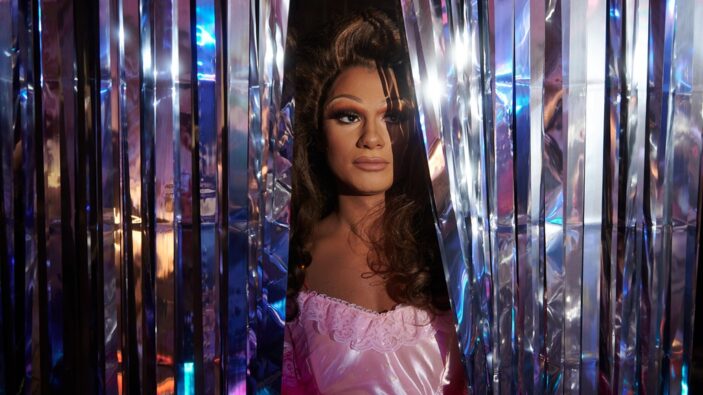
Thanks predominantly to RuPaul, and, more specifically RuPaul’s Drag Race, drag culture has firmly wedged itself in the mainstream. It’s always been there, it’s just more readily acceptable, or at least visible, and Amrou Al-Kadhi’s assured debut feature as both a writer and director, Layla, furthers such with its playful, authentic personality that drives home the note that drag doesn’t necessarily change who you are, but reveals your true self instead.
We first meet the titular Layla (Bilal Hasna, an absolute breakout performance if ever there was one) backstage at a queer London club, Feathers, preparing to take the stage. Out of drag, they prefer to still go by the same name and be addressed by their non-binary pronouns to the chosen friends and family that queer people so often surround themselves with. To their Palestinian parents, they’re still Latif, with the infrequent visits to home confirming the distance needed in continuing to express their true self away from familial pressure.
It’s at a corporate event where Layla’s life pivots in an unexpected direction, connecting with the kindly Max (Louis Greatorex), a cis-white, clean-cut, market-research type that describes meeting Layla as “an adventure”; “I never usually get guys like that”, Layla notes to their friends upon meeting in return. The event itself is an absolute disaster, more designed to sell ready-meals than celebrate the LGBTQIA community – despite asking Layla to perform; though their choice to lipsync to Agnes’ underrated dance track “Release Me” serves as a reminder of its euphoric greatness, and if we need another song to earn resurgence ala “Murder on the Dancefloor”, this wouldn’t be the worst option.
Though initially Layla, as a film, follows a somewhat-generic structure, in that the excitement of meeting Max means a variety of loved-up montages and the two getting to know each other through inviting the other into their spheres, it’s the smaller moments that keep the film from ever feeling predictable. It maintains a sense of naturality in how Layla spends their day (swiping on Grindr in one’s underwear will be felt by many a queer viewer), and the depiction of sex between Layla and Max flits between an honest eroticism and an exploratory kinkiness; we’ll just say the lubed-up heel of a 9-inch stiletto is utilised in one of the film’s more surprising sequences.
It’s the emotional aspect of Layla and Max’s relationship that truly ignites the film, however. They come from different worlds, even existing in different facets of their London surroundings, and it’s how they try to navigate within the other’s orbit that grounds the film in a universal layering. Max’s apartment feels almost clinical and void of personality, whereas Layla’s thrives on a sense of chaotic warmth. Max doesn’t always say the right thing (he has a hard time understanding the “they/them” pronouns, though shows a willingness to be educated), but Layla is never painted in stripes of perfection either, with their dismissal of their own sister (Sarah Agha) causing tension and exacerbating a lie that Layla perpetuated about the nature of their relationship. As Layla tries to dress down to fit into what they believe Max wants, he only embraces his creative side further, culminating in an awkward drag performance where Max’s enthusiastic hollers from the crowd distract Layla’s performance. As someone who leans into a more hetero-way of presenting, his encouragement isn’t necessarily deemed as support, highlighting a certain prejudice within the community itself.
As much drama Layla includes, it’s ultimately a love letter to the queer community, their defiance in owning their joy, and a mirthful representation of the art of drag performance. Al-Kadhi is a drag artist themselves, so the detail here as to what goes into such is second-to-none; Layla’s look is fabulously, meticulously created through both the costume work of Cobbie Yates and the makeup artistry of Adele Firth. We can’t help but be captivated by Layla’s performance whenever they’re on stage, brought so beautifully to fruition through Hasna’s embodiment in a film that celebrates one’s identity through a multitude of creative intersections.
![]()
![]()
![]()
![]()
![]()
THREE AND A HALF STARS (OUT OF FIVE)
Layla screened as part of this year’s Sundance Film Festival, which took place in-person (and select virtually) between January 18th and 28th, 2024, For more information head to the official Sundance page.
